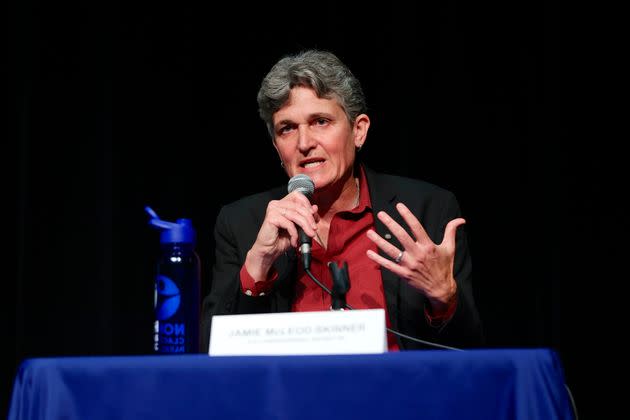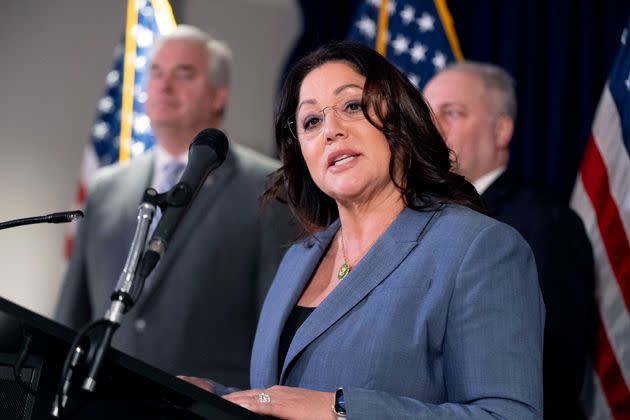2 Oregon House Primaries Will Test Progressive Clout
- Oops!Something went wrong.Please try again later.
- Oops!Something went wrong.Please try again later.
- Oops!Something went wrong.Please try again later.
- Oops!Something went wrong.Please try again later.

Oregon Democrats are set to cast ballots in congressional primaries on Tuesday, where two competitive House races could affect both the party’s chances of taking back the House and the relative strength of progressives and moderates inside the House Democratic Caucus.
In Oregon’s 5th Congressional District, former Democratic nominee Jamie McLeod-Skinner is competing with state Rep. Janelle Bynum, the national Democrats’ pick, for the chance to take on Republican Rep. Lori Chavez-DeRemer.
And in Oregon’s 3rd Congressional District, a solid Democratic seat that contains most of Portland, Multnomah County Commissioner Susheela Jayapal is locked in a tight race with state Rep. Maxine Dexter, a physician favored by pro-Israel donors and deep-pocketed outside groups.
A House Seat Democrats Can’t Afford To Lose
Last election cycle, McLeod-Skinner, a progressive small-business owner and former civil servant from central Oregon, unseated centrist Rep. Kurt Schrader in a contentious primary in Oregon’s 5th. Schrader, the Democratic Congressional Campaign Committee (DCCC) and corporate-backed super PACs heavily outspent McLeod-Skinner and her backers, but McLeod-Skinner capitalized on the new makeup of the district and on Schrader’s obstruction of President Joe Biden’s prescription drug price negotiations.
But in November, McLeod-Skinner lost the seat to Chavez-DeRemer, a former mayor of Happy Valley. Chavez-DeRemer and national Republicans seized on McLeod-Skinner’s ties to progressive groups, such as the Working Families Party, and her government work in the San Francisco Bay Area to paint her as an anti-police radical at a moment of growing suburban backlash to Portland’s influential activist left. The election’s outcome ― in a district Biden carried by nearly 9 percentage points ― denied progressives an opportunity to show they could win a general election with a nominee they had propelled through a primary.
Former aides to McLeod-Skinner accused her of being verbally abusive, as well as allegedly making her driver feel physically threatened. McLeod-Skinner has denied the accusations, saying instead that her campaign fired the driver because he was physically threatening her.

This cycle, national Democrats, who would need to flip just a handful of seats to retake the House, were not going to take any chances. House Democratic Leader Hakeem Jeffries (N.Y.) personally reached out to Bynum, who represents the Portland suburbs in the state legislature, to persuade her to run.
Bynum, a mainstream liberal and restaurant owner, would be the first Black member of Congress from Oregon, where only 2% of the population is Black. Police were called on Bynum, the only Black member of the Oregon state House, while she was canvassing a white neighborhood in 2018.
Bynum’s selling points as a more electable candidate are obvious. The Happy Valley resident defeated Chavez-DeRemer in two consecutive state House races, in 2016 and 2018.
The DCCC, which has gotten pushback for wading into contentious Democratic primaries in the past, has gone all in for Bynum, using a campaign-finance loophole to co-bankroll TV ads with her campaign. Her list of endorsers is a who’s who of important Democratic interest groups and elected officials, including the super PACs 314 Action Fund and Mainstream Democrats, which have jointly spent $1.2 million on her behalf.

McLeod-Skinner’s only significant source of outside support is from Health Equity Now, which sprung up days ago, seemingly out of nowhere, to spend nearly $500,000 on promoting McLeod-Skinner’s support for “Medicare for All” and other “progressive values.” The group’s funders are still unknown, but it has a Republican treasurer and purchased ad time using a Republican-affiliated firm.
That has raised the prospect that national Republicans are trying to elevate McLeod-Skinner in the hopes of facing her in the general election. Bynum’s campaign manager, Blakely Wall, cited it as evidence that McLeod-Skinner is “Republicans’ dream candidate.”
But McLeod-Skinner could still win this thing. A late April internal poll released by the Bynum campaign had her leading McLeod-Skinner by just 3 percentage points ― and that was before McLeod-Skinner had begun advertising on television.
The handful of policy differences between Bynum and McLeod-Skinner could also be significant to a certain kind of discerning, left-leaning voter. Like other Democratic state lawmakers in Oregon, Bynum has accepted corporate donations; unlike McLeod-Skinner, she refuses to forswear contributions to her federal campaign from corporate PACs and does not support Medicare for All. Bynum is backed by the pro-Israel group Democratic Majority for Israel PAC and the business-friendly New Democrat Coalition. McLeod-Skinner’s campaign materials, meanwhile, emphasize both her commitment to Democratic priorities, such as abortion rights, and a populist commitment to fighting corruption and corporate abuses of power.
More than any other issue, though, McLeod-Skinner has seized on Bynum’s lone opposition to a 2019 bill extending the statute of limitations on sexual assault survivors’ ability to sue their alleged attackers, from two years to seven years. Bynum, who cited the need to give the accused due process and to recognize the racial discrimination in the legal system, voted for a more moderate bill lengthening the statute of limitations to five years.
Finally, some local Democrats have chafed at the DCCC’s intervention in the race. The chairs of four county Democratic parties in the district expressed their objections to the national campaign arm’s involvement in a February letter.
Judy Stiegler, a former Democratic state representative from Bend who is supporting McLeod-Skinner, said she was “off-put” by the national party’s involvement.
Asked about electability concerns, Stiegler said, “It’s going to be a tough race no matter who wins the primary.”

Portland Progressive Battles Pro-Israel Donors
Rep. Earl Blumenauer’s impending retirement has created a rare opportunity for aspiring Democrats to represent Oregon’s solidly Democratic 3rd Congressional District. The seat, which includes most of Portland, its eastern suburbs and a constellation of rural communities below the Hood River, has historically been one of Congress’s more liberal districts.
The two most formidable contenders are Susheela Jayapal, who serves in county government and is an older sister to Rep. Pramila Jayapal (D-Wash.), chair of the Congressional Progressive Caucus, and state Rep. Maxine Dexter. Eddy Morales, a progressive organizer and Gresham City Council member, is also running but has raised fewer funds with which to communicate his message.
Jayapal is the left-wing favorite in the race, having picked up the support of Congress’s big-name progressives.
Dexter, also a progressive by national standards, has benefited from a last-minute surge in outside spending on her behalf. The 314 Action Fund, which backs Democratic scientists or people from related professions, has spent more than $2.2 million boosting Dexter’s bid. And a super PAC of unknown origins and funding, Voters for Responsive Government, has arisen to spend more than $3.2 million blasting Jayapal.
At about the same time, pro-Israel donors affiliated with the American Israel Public Affairs Committee (AIPAC) have begun rushing donations directly to Dexter’s campaign, including $220,000 on May 7 alone, according to The Intercept’s analysis of campaign finance records.
“I give all my contributions through AIPAC,” donor Jone Dalezman told The Intercept. “Whenever I am asked to give to their endorsed candidates, I give.”
Although Dexter has called for a negotiated cease-fire in Gaza and has criticized Israeli Prime Minister Benjamin Netanyahu, unlike Jayapal, she has not come out in favor of imposing stricter conditions on U.S. aid to the Jewish state.

Jayapal and her allies have done their best to at least make the pro-Israel donors’ support for Dexter’s campaign a liability, noting that many of the AIPAC donors who have flocked to her are Republicans. One major example is Larry Mizel, the chair of a Denver-based home-building giant, who served as finance chair on former President Donald Trump’s 2016 presidential campaign.
“Republican megadonors have spent millions to defeat my sister Susheela Jayapal ― all because she is a proud, effective progressive,” Rep. Pramila Jayapal posted Sunday on X.
The progressive super PAC cavalry has not come out in force for Susheela Jayapal, however, raising doubts about whether she can sound the alarm about Dexter’s backers in time for it to matter. The Impact Fund, a super PAC that supports Indian American candidates, has spent nearly $160,000 boosting Jayapal in direct mail and text messages.
But despite Pramila Jayapal’s support, the Congressional Progressive Caucus PAC, which has spent six-figure sums in Democratic primaries in the past, has stayed out of the race. A spokesperson for the PAC declined to comment about why and whether an endorsement had been put to a membership vote.
